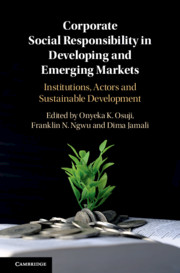 Corporate Social Responsibility in Developing and Emerging Markets
Corporate Social Responsibility in Developing and Emerging Markets from Part III - Normative and Utility Perspectives
Published online by Cambridge University Press: 18 December 2019
Organisations and managers are increasingly being held accountable for CSR in their spheres of operation. While a few organisations already have structures to deal with competing demands from stakeholders with regards to corporate social responsibilities, some are caught flatfooted. This paper takes a look at the theoretical underpinning of CSR and CRS education in the literature. It also focuses on exploring the following questions. How do leaders or managers acquire the sensibilities of being in tune with the social responsibilities of an organisation? How do managers acquire the necessary knowledge and sense to handle corporate social responsibilities expectations? How are MBA institutions handling this critical task of preparing mangers as decisionmakers in charge of CSR for the future? Can a model emerge from current CSR education practices? These issues are addressed in this chapter.
To save this book to your Kindle, first ensure no-reply@cambridge.org is added to your Approved Personal Document E-mail List under your Personal Document Settings on the Manage Your Content and Devices page of your Amazon account. Then enter the ‘name’ part of your Kindle email address below. Find out more about saving to your Kindle.
Note you can select to save to either the @free.kindle.com or @kindle.com variations. ‘@free.kindle.com’ emails are free but can only be saved to your device when it is connected to wi-fi. ‘@kindle.com’ emails can be delivered even when you are not connected to wi-fi, but note that service fees apply.
Find out more about the Kindle Personal Document Service.
To save content items to your account, please confirm that you agree to abide by our usage policies. If this is the first time you use this feature, you will be asked to authorise Cambridge Core to connect with your account. Find out more about saving content to Dropbox.
To save content items to your account, please confirm that you agree to abide by our usage policies. If this is the first time you use this feature, you will be asked to authorise Cambridge Core to connect with your account. Find out more about saving content to Google Drive.